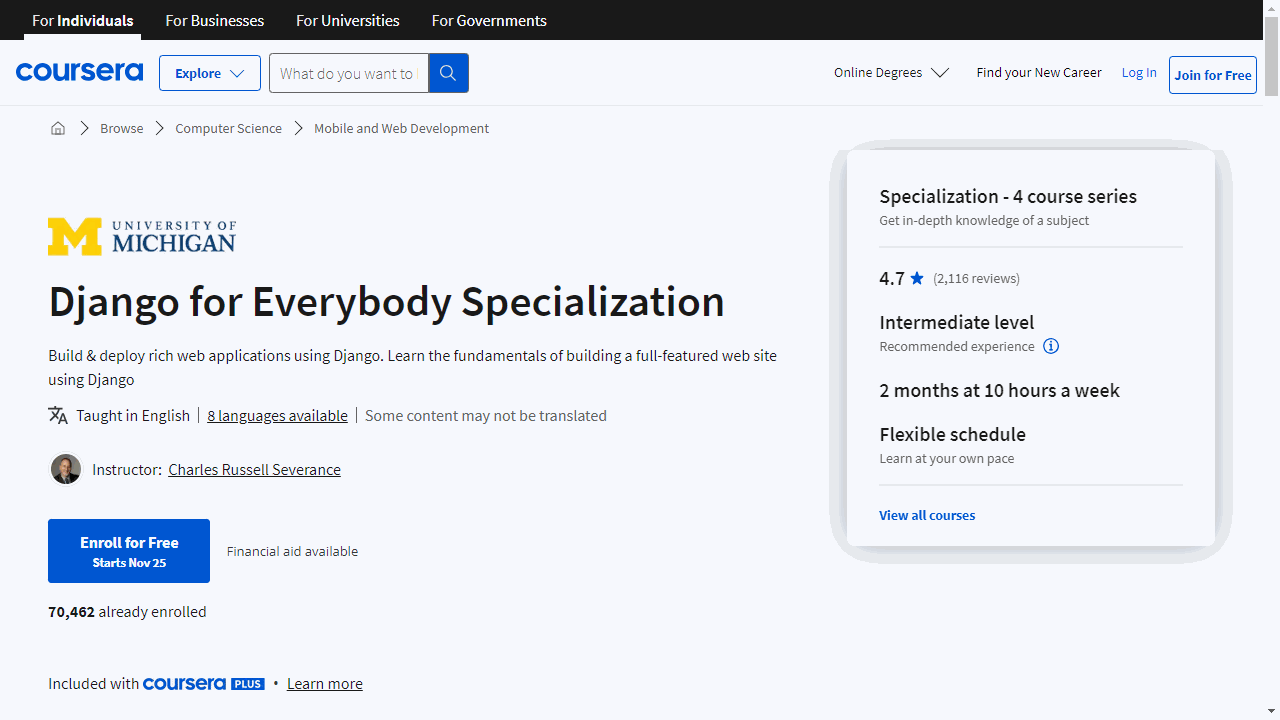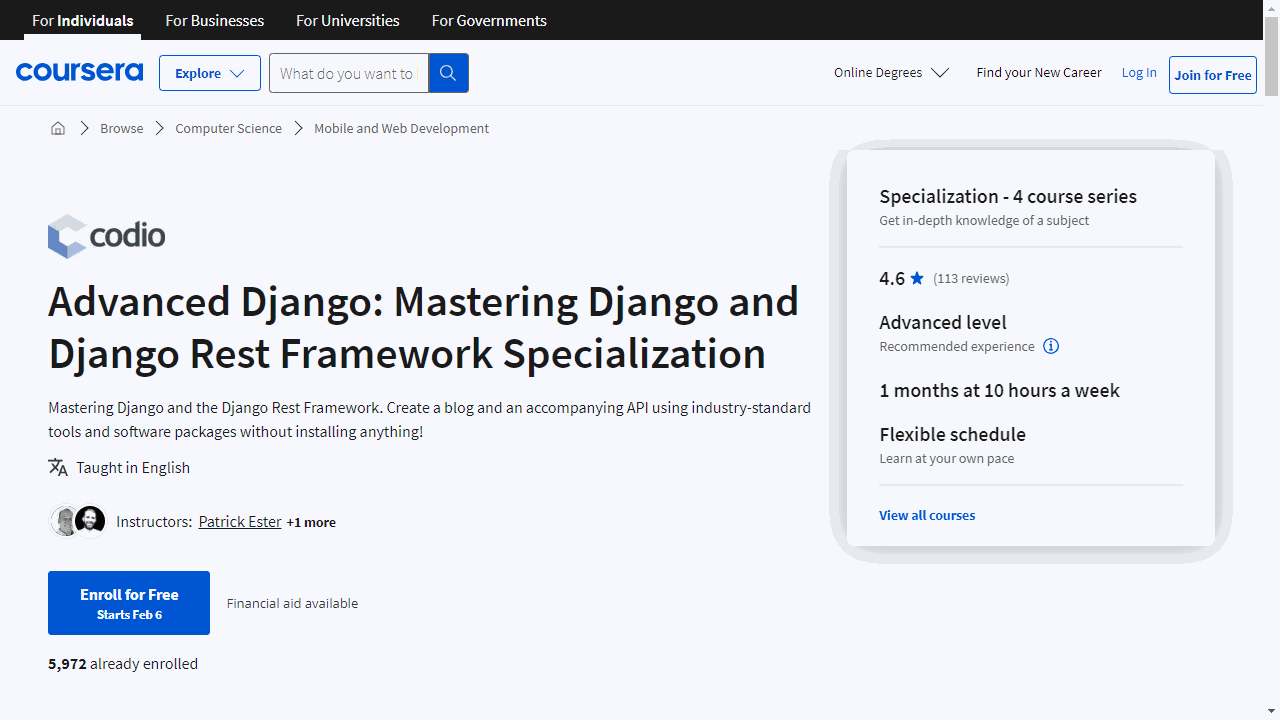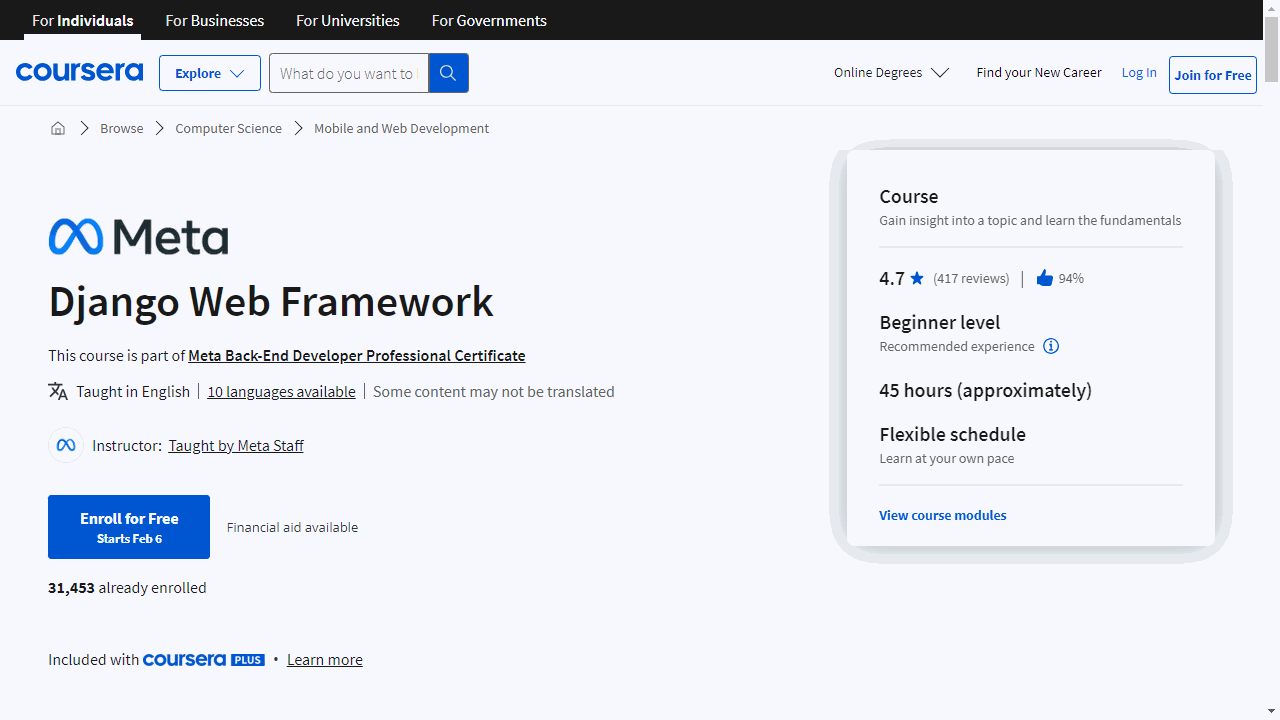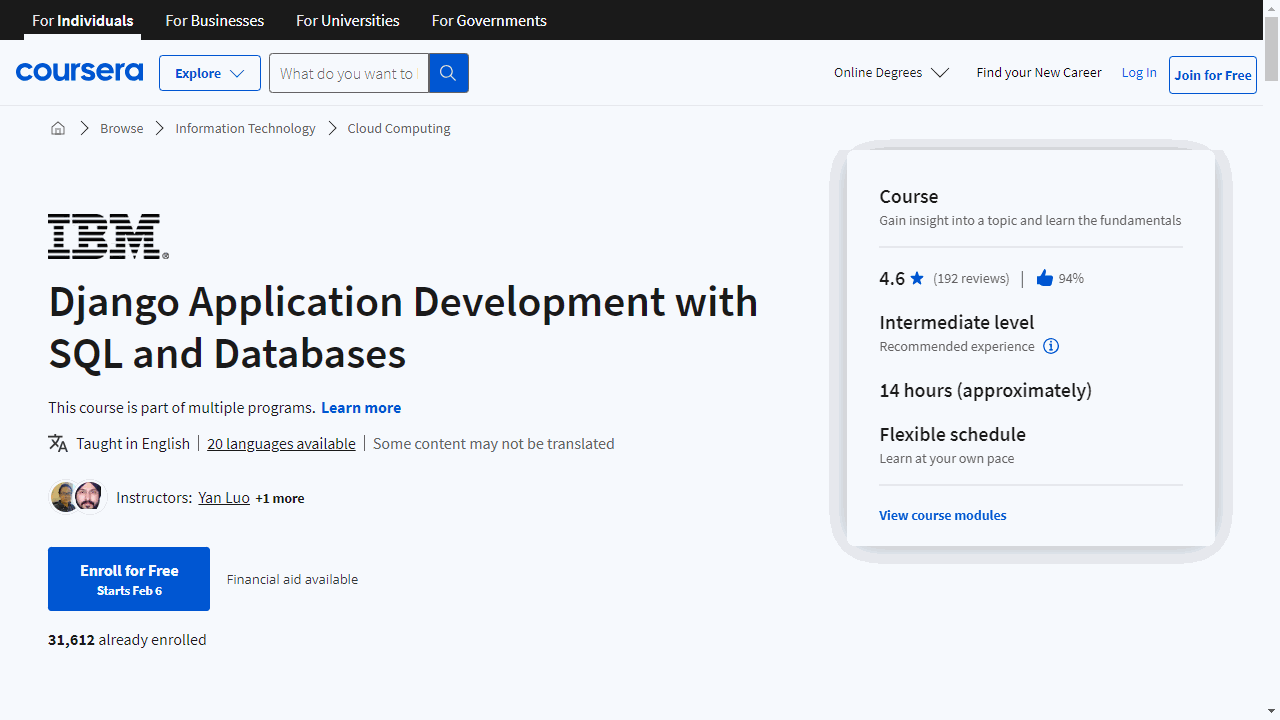Django is a powerful Python framework for building web applications, known for its rapid development capabilities and flexibility.
Learning Django opens doors to a world of web development opportunities, from creating simple websites to complex web applications.
You can leverage Django to build dynamic websites, manage user interactions, and implement robust functionalities.
This framework empowers you to develop web applications efficiently and confidently.
Finding the right Django course on Coursera can feel overwhelming, as you navigate through numerous options.
You’re seeking a course that’s comprehensive, engaging, and delivered by experts, but also aligns with your learning style and goals.
For the best Django course overall on Coursera, we recommend the “Django for Everybody Specialization” by the University of Michigan.
This specialization offers a structured and hands-on learning experience, guiding you from the fundamentals of web development to building practical Django applications.
The instructors provide clear explanations, real-world examples, and interactive exercises that make learning enjoyable and effective.
This is just the beginning of your Django learning journey!
There are other excellent options available on Coursera.
Keep reading to explore our recommendations for different learning levels, specific Django topics, and career goals.
Django for Everybody Specialization
Django is a very popular Python framework for building web applications.
In this specialization, you’ll learn to use Django to create dynamic websites, from simple webpages to sophisticated applications.
This series begins with “Web Application Technologies and Django,” where you’ll grasp the essentials of web communication through HTTP and craft web pages with HTML and CSS.
It’s a practical introduction, setting the foundation for web development and culminating in deploying your first Django app.
Progressing to “Building Web Applications in Django,” you’ll delve into Django’s database interactions, employing Object-Relational Mapping (ORM) for efficient data handling.
This course sharpens your skills in Python’s Object-Oriented programming and SQL, empowering you to construct robust data models and manage application objects with Django’s tools.
“Django Features and Libraries” elevates your skill set by introducing user authentication, session management, and enhancing the user interface of your applications.
You’ll apply these concepts in a real-world project, developing a classified ads website that addresses common web development challenges.
The final course, “Using JavaScript and JSON in Django,” brings dynamic capabilities to your toolkit.
You’ll learn to use JavaScript and jQuery for responsive, interactive web elements, and JSON for seamless data exchange between server and client.
Advanced Django: Mastering Django and Django Rest Framework Specialization
Provider: Codio
If you have a foundation in Python and basic Django, this specialization propels you into advanced territories, from crafting blogs to mastering APIs and beyond.
The journey begins with “Advanced Django: Building a Blog,” where you dive into advanced project setups, class-based views, and critical topics like caching and query optimization.
You’ll emerge with the ability to create custom filters, optimize database operations, and authenticate users with Google, all without needing installations.
Moving on, “Introduction to Django Rest Framework” introduces you to the power of APIs in Django.
You’ll gain practical skills in serialization, ViewSheets, and authentication, equipping you to build robust APIs and enhance them with serializers, routers, and permissions.
“Advanced Django Rest Framework” takes you deeper, focusing on testing, performance optimization, and frontend integration.
You’ll learn to write tests for your applications, optimize performance using caching and throttling, and seamlessly integrate with ReactJS, ensuring your applications are both efficient and engaging.
Finally, “External APIs and Task Queuing” rounds off your learning by teaching you to connect with external APIs and implement task queuing.
You’ll master using Celery and Redis for scheduling tasks, and apply all the skills acquired to create a comprehensive, portfolio-ready project.
Django Web Framework
Provider: Meta
This course guides you from understanding the basics to mastering advanced Django functionalities, ensuring a comprehensive learning journey.
Starting with an introduction to Django, you’ll quickly grasp what Django is and its application in real-world scenarios.
The course emphasizes practical learning, pushing you to create your first project and app early on.
This hands-on approach not only solidifies your understanding but also boosts your confidence in using Django.
A significant focus is placed on the Model-View-Template (MVT) architecture, a cornerstone of Django.
You’ll learn to craft views, map URLs, and manage HTTP requests—skills essential for web development.
The course also delves into URL namespacing and error management in views, preparing you to tackle common web development challenges.
When it comes to models, the course covers everything from creation, migrations, to using Django’s Object Relationship Mapping (ORM) for efficient database interactions.
You’ll also explore forms, the Django admin, and setting up a MySQL connection, equipping you with the tools needed for robust web application development.
Templates are another critical area covered.
You’ll become proficient in creating dynamic templates using Django’s template language and understand template inheritance.
This knowledge is crucial for developing scalable and maintainable web applications.
Throughout your learning journey, you’ll engage in exercises and projects that reinforce your knowledge through practical application.
From creating views and working with forms to configuring database connections, these hands-on experiences are designed to prepare you for real-world development tasks.
By the course’s end, you’ll have designed and built a simple Django app, with the opportunity to receive feedback through a peer review process.
Django Application Development with SQL and Databases
Provider: IBM
The course begins by laying a solid foundation in data and databases, covering both relational and non-relational types.
You’ll quickly move on to mastering SQL commands such as SELECT, COUNT, DISTINCT, LIMIT, INSERT, UPDATE, and DELETE.
The curriculum ensures you understand how to effectively structure data by teaching you to CREATE, ALTER, DROP, and truncate tables.
A significant focus of the course is on Django, particularly its Object-Relational Mapping (ORM) system, which seamlessly connects the dots between real-world data structures and the relational model.
You’ll learn to define Django models, perform CRUD operations, manage related objects, and navigate complex queries.
Progressing further, the course dives into the Django Model-View-Template (MVT) pattern, equipping you with the skills to create Django apps, utilize the Django admin, and craft views and templates.
Advanced Django template features are explored, alongside practical deployment techniques using Docker.
The curriculum also covers class-based and generic views, the Django authentication system, Bootstrap integration for styling, and Django static files management.
A significant emphasis is placed on deploying your Django apps, ensuring you’re ready to bring your projects to fruition.




